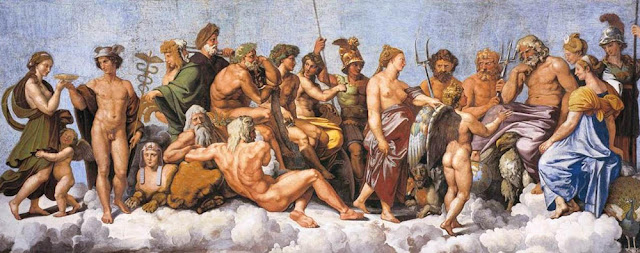Theocratic order in modern pagan polytheism. Visiting Epicurus
We continue to study this important topic Faith and Philosophy. As the sages said, in order to defeat the enemy, you need to know his weapon. To know how dangerous philosophy is and how the Lord looks at all this.
Between faith and philosophy there has never been and never will be peaceful coexistence. The main argument of the Faith of God is monotheism, or theocratic order.
Apostle Paul
The main argument of philosophy is the deification of creation. Idolatry. Polytheism or pagan polytheism.
Greek philosopher Epicurus
By eliminating the Creator and the Creator as a genuine source of reliable information about the Universe, representatives of philosophical schools try to present us with their own, alternative picture of the world.Sooner or later, each of us will come into contact with this and will pass the exam, as it happened once with the Apostle Paul in the Greek capital. In Athens.
He happened to meet with advanced Greek philosophers there. How it all began and how it all ended, we practically know. But some details could remain in the shade. This will be discussed.
“In anticipation of them in Athens, Paul was indignant at the sight of this city full of idols” (Acts 17:16).
Why was Paul indignant in spirit? No, this is not about aesthetics or cultural visual addictions. Someone likes baroque, someone postmodernism. No. Paul speaks of completely different sensations. Here we are talking about the spiritual incompatibility of one with the other.
Indignant in spirit - What it means to be angry, outraged, and indignant. Translated by King James - His spirit was stirred in him. What does this mean?
And the reasons for this were very serious. At that time, pagan polytheism flourished in Greece. The cult of the Olympic gods. Each corner had its altars and its fans.
Faith recognizes the Source and worships the Creator. And philosophy, consciously departing from the Source, begins to worship the creature instead of the Creator. That is, an idol is an instrument of deification of creation that destroys the theocratic order. And idolatry abolishes the First and fundamental commandment of worship: "Worship the Lord your God and serve Him alone."
It was so revealing in the Greek capital. The philosophical schools in Athens patronized pagan idolatry.
By the way, no matter what philosophy is - even Western, even Eastern, even Marxist-Leninist, even Freudian, even Greek-Epicurean, even modern liberal - they are all united by a fierce and implacable war with the Creator and Creator of this world. The war with the biblical picture of our universe. War with the reality of the kingdom of heaven.
These are just some of the pearls of the pseudo-wise philosophers that were most often proclaimed in the gardens of Epicurus.
Belief in immortality was born out of the thirst for insatiable people, recklessly taking advantage of the time that nature had given them. The wise will find this time sufficient to go around the whole range of attainable pleasures, and when the time comes for death - the busy to leave the table, making room for other guests. For a wise man, one human life is enough, and a fool will not know what to do with eternity.
Death for man is nothing, because when we exist, death is not yet present, and when death is present, then we do not exist.
We will eat, drink and have fun, because we will die tomorrow.
What is the Creator? What is the atonement and sacrifice of the Lord Jesus Christ?
Against the background of Paul, their Bible was some kind of fantastic novels and absolutely romantic atheism. We are not indebted to anyone and owe nothing to anyone. Everything will end with death. We are, but there is no death. And if death is, then we are already gone. And Faith in immortality and eternal life is the lot of insatiable, limited people...
And imagine - against this background Paul appears, who speaks of both death and the resurrection of Jesus Christ.
Unlike the Athenians themselves, who rudely called him idle talk and talker, he behaved with dignity, culture and intelligence. Overcoming internal hostility, he diplomatically began his speech. I did not call them stupid idolaters, although there was a reason, and moreover, a serious one.
In the Athens Areopagus, Paul held a brilliant master class in public speaking. How to defend a theocratic order in conditions of pagan polytheism. Well, just aerobatics. I’m sure one day it will come in handy.
I highly recommend watching this service.











Комментарии
Отправить комментарий